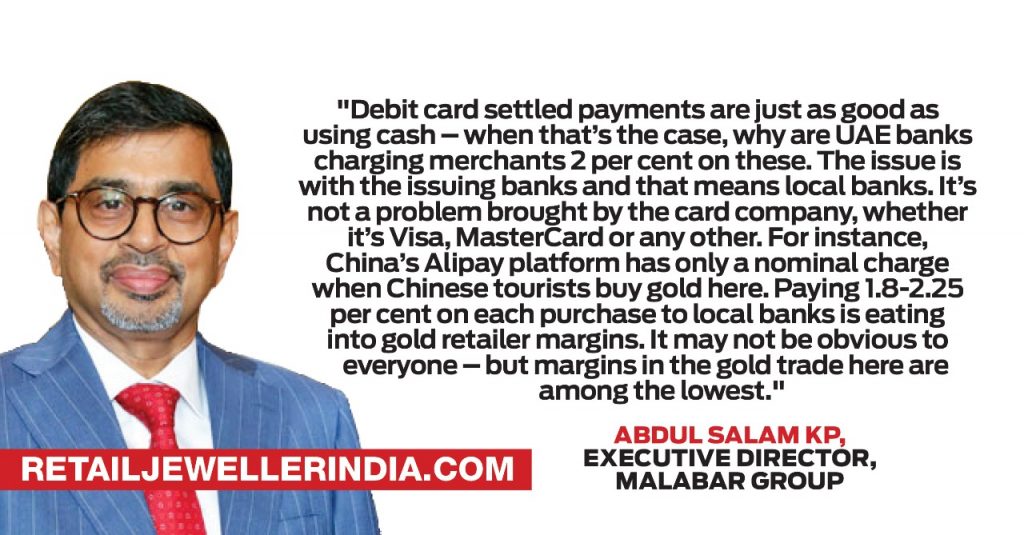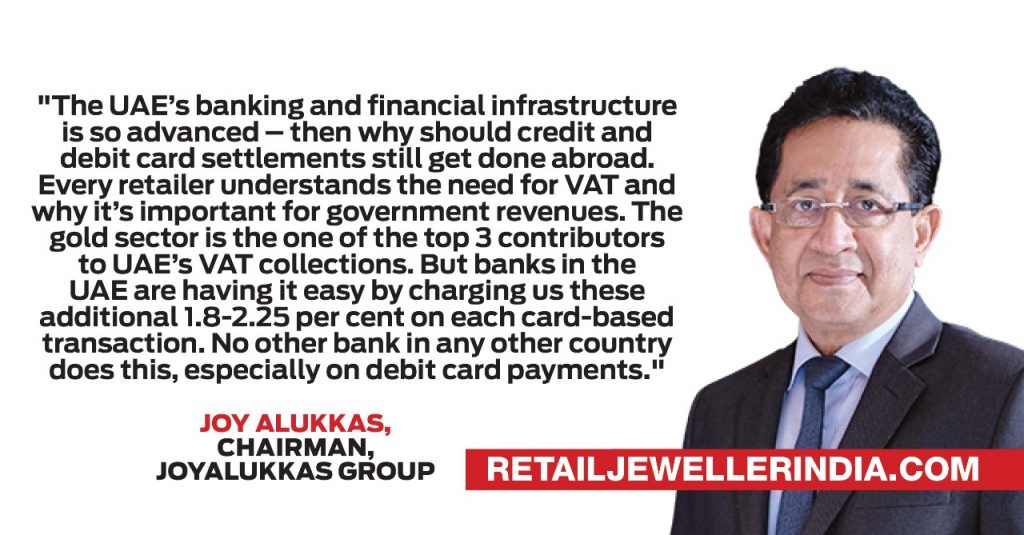RJ Market Watch
UAE gold retailers feel full burden of credit, debit card fees by banks

Banks in the UAE should drop the high fees they impose on jewellery retailers for all credit and debit card transactions, gold industry sources say. Given the current dire situation for the gold trade, continuing to pay these commissions to banks will threaten its survival, the sources add.
The UAE banks have the highest card commission rates – otherwise known as interchange fees – among Gulf states on credit and debit card settlement fees imposed on gold merchants.
“These days, every dirham saved raises the survival chances of gold retailers,” said Tawhid Abdullah, who heads the Dubai Gold and Jewellery Group. “We are making this appeal to the UAE Central Bank and local institutions to lower the credit and debit card charges on gold merchants.
“As per the laws of the land, we do not pass on these charges to shoppers – so the credit and debit card fees are essentially taxing gold merchants. And we are feeling the financial pain.”
The UAE’s gold and jewellery sector – covering bullion, gold and diamond jewellery, as well as rough and polished diamonds – is estimated at Dh300 billion. This category has felt the full impact of the COVID-19 outbreak, while higher gold prices – at $1,700 plus an ounce – has all but destroyed consumer demand.
In these circumstances, gold retailers have again revived their demand to scale back credit and debit card fees. But will banks listen?
What are the rates now?
In the UAE, a gold retailer will have to pay between 1.8-2.25 per cent of the bill to the card issuing banks, on each transaction involving a credit or debit card.
That is against 1.25-1.45 per cent on credit cards in Saudi Arabia, while for debit it’s 0.25 per cent, while Oman has 0.75-1 per cent on credit and debit cards.
Even in other markets where gold remains a favourite with shoppers, the card fees on merchants are nowhere near what they pay in the UAE. For instance, jewellery retailers in India pay 0.7 per cent, while those purchases made using State Bank of India issued debit cards merit 0 per cent.
In Singapore, credit card transactions involve merchant fees of 1.6-2 per cent, but debit cards feature just 0.6 per cent.

“Debit card settled payments are just as good as using cash – when that’s the case, why are UAE banks charging merchants 2 per cent on these,” said Abdul Salam K.P., Executive Director at Malabar Gold & Diamonds. “The issue is with the issuing banks… and that means local banks. It’s not a problem brought by the card company, whether it’s Visa, MasterCard or any other.
“For instance, China’s Alipay platform has only a nominal charge when Chinese tourists buy gold here.
“Paying 1.8-2.25 per cent on each purchase to local banks is eating into gold retailer margins. It may not be obvious to everyone – but margins in the gold trade here are among the lowest.”
Is there a way out?
Local financial industry sources say that the higher charges are because all of the credit and debit card settlements are done outside of the UAE and then processed back to the issuing banks here.

“The UAE’s banking and financial infrastructure is so advanced – then why should credit and debit card settlements still get done abroad,” said Joy Alukkas, Chairman of Joyalukkas, which was the first jewellery retailer to create a Gulf-wide store network.
“Every retailer understands the need for VAT and why it’s important for government revenues. The gold sector is the one of The top 3 contributors to UAE’s VAT collections.
“But banks in the UAE are having it easy by charging us these additional 1.8-2.25 per cent on each card-based transaction. No other bank in any other country does this, especially on debit card payments.
“UAE banks must realise the extremely difficult market circumstances everyone is passing through – “taxing” us as much as 2 per cent is not the answer.
“Gold trade is all about volumes and not high margins. This is not like the fashion business where profit margins for retailers are in high double-digits.”
A possible solution would be something like a “UAE Switch”, which would bring down the cost on debit cards. “There should be a transparent discussion with Visa and MasterCard – initiated by UAE Central bank – and all the leading banks in the UAE to lock in the interchange fees specifically for the Jewellery trade considering its importance to the national GDP
A heavy cost to bear
Currently bank-related fees make up the fourth highest cost element for jewellery retailers after manpower, rental expenses and the spending on promotions.
“The entire risk of doing business is borne by the gold retailer,” said Salam. “But for banks to keep charging these high credit and debit card settlement charges on gold retailers is easy money for them.
“It’s not that UAE banks don’t know to charge lower. On supermarket purchases, the merchant fees are lower. And when petrol stations banned credit card payments because of the high charges, banks were willing to reduce them.
“We believe debit card transaction charges on merchants should be below 1 per cent.”
Jewellery retailers are hoping they will catch some sort of a break from banks, especially if the Central Bank takes up their case.
Already, they are suffering from low shopper turnout – the average is now at 30 per cent of what it used to be. To keep paying the 1.8-2.25 per cent on each card based transaction now is one cost too many for them.
Courtesy: Gulfnews





 Wide Angle1 month ago
Wide Angle1 month agoIndia has overtaken China to become second largest diamond market: De Beers CEO Al Cook

 Daily News1 month ago
Daily News1 month agoUS-based private equity firm Advent International to acquire Orra Fine Jewellery, say media reports

 Wide Angle1 month ago
Wide Angle1 month agoEminent jeweller Viren Bhagat sets up first global boutique in London’s Mayfair

 Daily News1 month ago
Daily News1 month agoLimelight Lab Grown Diamonds secures $ 11 million in funding to fuel its retail growth























